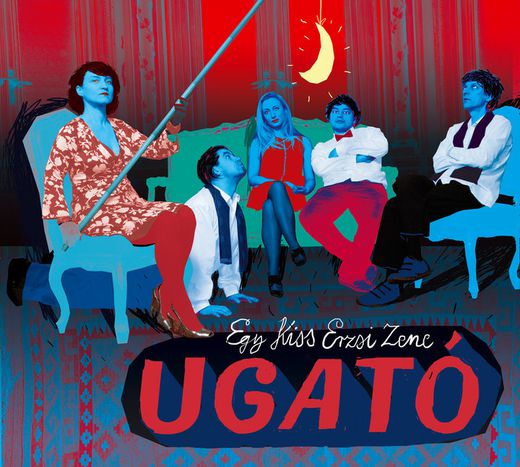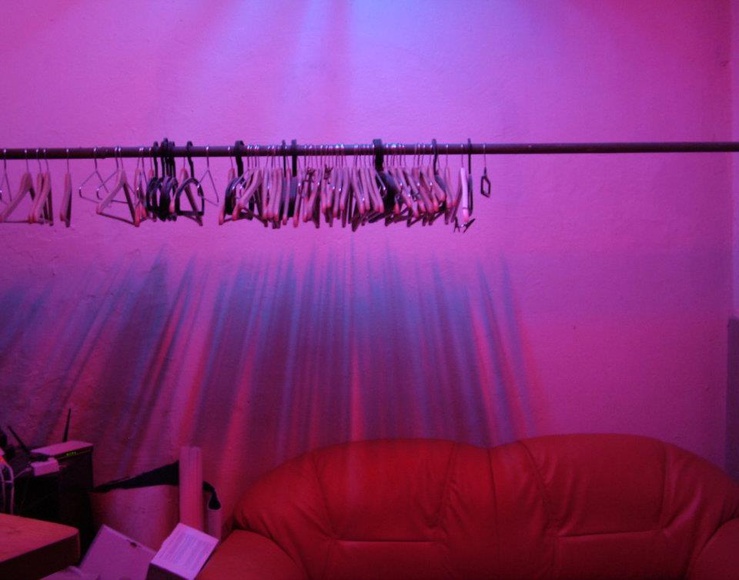
Hungarian singer Erzsi Kiss: ‘My language is based on musicality’
Published on
It’s much more meaningful gobbledygook, says the singer in the Hungarian band 'Egy Kiss Erzsi Zene' about her lyrics. The musician and puppeteer talks to us about singing 'in no language'
cafebabel.com: Erszi,your lyrics are made up of words you create. Where did you get the idea of ‘languagelessness’ from?
Erzsi Kiss: I didn’t have a model for this – it’s something that comes from my childhood. When I was involved in theatre, I often got to improvise or imitate african languages and drums. I find that african languages liven up percussion music and I often look for that kind of onomatopoeic word. So I had two sources of inspiration: western ideas, musical elements and songs which I’ve been working on since my childhood, but also these arabic and slavic rhythms which I used to improvise on stage.
cafebabel.com: What do the lyrics of your songs mean? Can you explain the meaning of this so-called 'kiss erzsi language'?
Erzsi Kiss: It’s hard to find a one-word equivalent for 'gobbledygook'. It’s often called this and it’s correct to a certain extent. However, I don’t like this word because it suggests a kind of infantilism; it suggests something which isn’t very serious. When I see someone trying to imitate quasi-languages or just pretending speaking in a made-up language, I can tell whether or not it’s nonsensical.
In contrast, my language is based on considerable musicality. I usually compose the melodies together with the words and ideas. The melody rings out and the lyrics have to reflect it. The language has to merge with that musical world I want to recapture. For example, if the tune is chanson-like, a french-styled lyric is the most helpful, while if the music is more gypsy-like, a slavic style could work better. Within this there’s the possibility to express the feelings in different ways, more softly or more strongly for example, calling for different responses from the listener.

cafebabel.com: Can we find a meaning or a story in the lyrics?
Erzsi Kiss: Meanings can be perceived through emotions. There are words and syllables which are understood internationally, like ‘mamma’. I believe that most central Europeans grasp the meaning of the songs, but in all probability other people understand them as well.
cafebabel.com: Do you write down the lyrics or do you prefer to record and then replay them?
Erzsi Kiss: I mostly record them. This is because I want to reproduce very accurately what I originally improvise.
cafebabel.com: How did you find each other with the members of the band 'Egy Kiss Erzsi Zene'?
Erzsi Kiss: We formed the band in 1996. I really felt ready to perform and so started looking for people to play with. I contacted Csaba Hajnóczy in 1995 and we had been experimenting for a year. Then he invited Gabi Kenderesi and later Árpád Vajdovich who is still a member of the band. Over the years, the band re-formed.
cafebabel.com: Did these member-swaps alter your style?
Erzsi Kiss: Of course. My music is influenced by my own ideas, the impression of the rumbling in my head and by the music around me. You can hear the influence of János,Hunor G. Szabó and Zoli Farkas when listening to the albums.
cafebabel.com: Do you devote yourself entirely to music or are you still involved in theatre?
Erzsi Kiss: Luckily I don’t have to separate the two. For a while now I’ve been composing music for puppet shows. My latest play premiered at the end of 2010. Together with Belgian director Karel Van Ransbeeck and Ákos Futó, a puppeteer from Veszprém, a city in western Hungary, I am involved in a puppet theatre for toddlers. We have a partnership with the Belgian theater de spiegel and the kabóca puppet theatre in Veszprém. At the Kolibri festival in September I was awarded the Michel Indali prize for my performance. I really enjoy playing. We sing for very young children accompanied by the ukulele and Ákos. We use abstract puppets, shaped like balls and cubes. Northern Hungary has a tradition of this abstract. There’s no real story; the whole play consists of small sketches. For half an hour these tiny children are fascinated, and watch without crying. At the end of the performance they get to feel the puppets. The children of today’s digitalised world reach out open-mouthed to touch felt balls and wooden cubes. It’s truly marvellous.
Read the full article on cafebabel.com's Budapest blog
Images: © Egy Kiss Erzsi Zene/ Facebook



